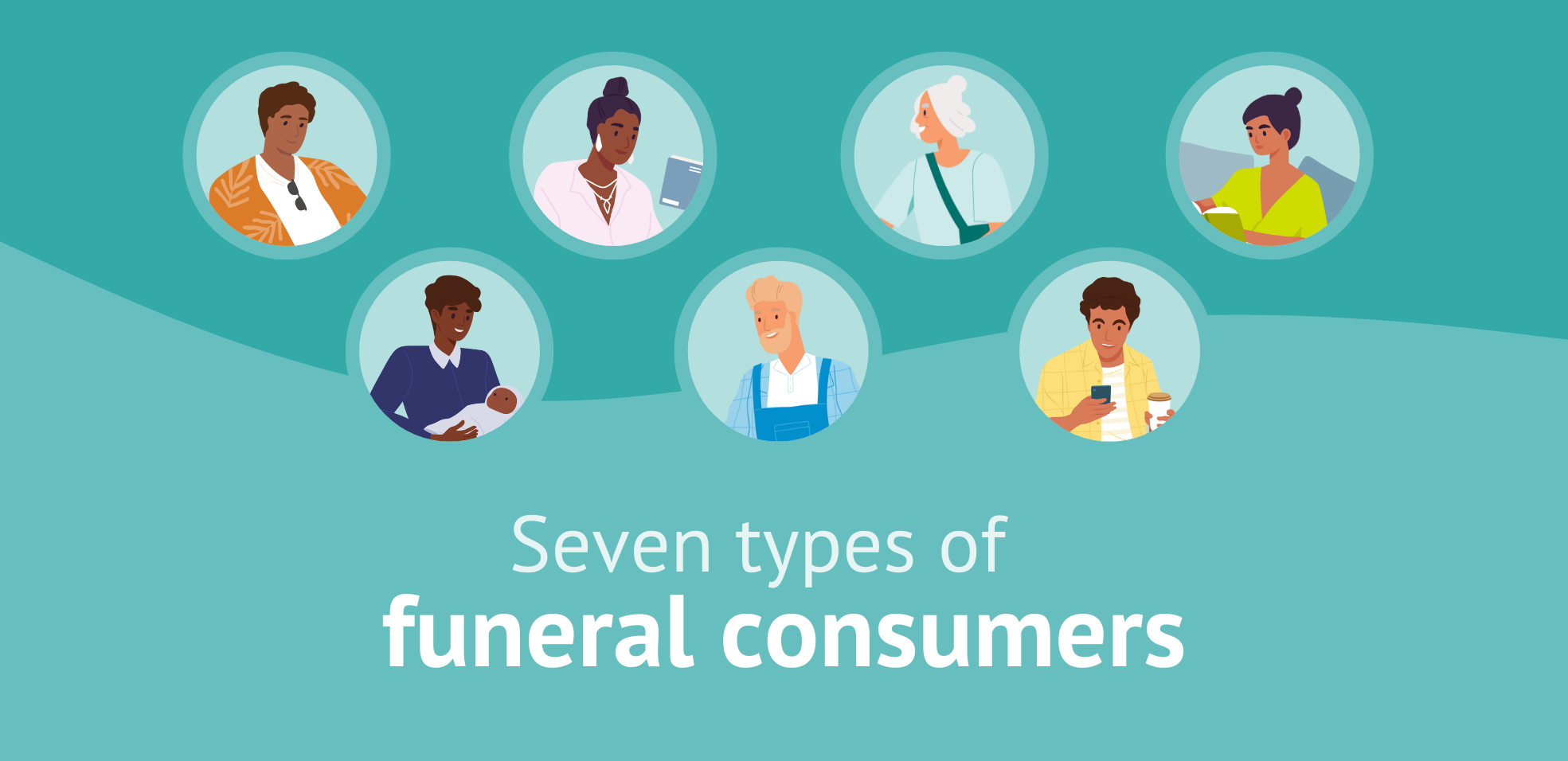The 7 types of funeral consumers
December 12, 2024
How well do you know your families?
You may have noticed families have changed. More people are being cremated. People want fewer religious elements at their services. Technology use has gone up. All of these changes leave you wondering how you can serve them better.
To help funeral professionals understand families, Directors Investment Group (our parent company) and McKee Wallwork (a market research company) joined forces in 2021 to conduct one of the largest funeral consumer studies in the nation.
They interviewed thousands of everyday people from ages 35-69 to ask them about all parts of funeral service (and their personal lives).
Questions included:
-
How likely are you to prearrange a funeral?
-
Do you have tattoos?
-
How active are you on social media?
And hundreds more. But every question had a purpose.
The answers to these questions helped the two companies notice patterns around funeral trends, which led to 5 key findings of the study. But that wasn’t all.
They noticed that families themselves had changed, too.
As a result, consumers were categorized into 7 groups (or segments), which look very different than the 6 consumer segments of the previous decade. These 7 types of funeral consumers have different lifestyles, attitudes, and perceptions about funerals.
To connect with today's families, you need to understand their expectations and preferences. Let’s take a look at the 7 consumer segments from the study and share the tools and tech you should be using to connect with them!
The 7 types of funeral consumers
Type 1: Resolute Rookies
Most likely to try to do everything themselves - even when it comes to funerals.
Named after their unwavering attitudes, Resolute Rookies have a do-it-yourself approach to life…and funerals. They are a younger group and tend to have the least exposure to funerals. As a result, they are less likely than other segments to see the value of funerals. They’re also the least religious of all the segments.
Resolute Rookies are unwavering in their beliefs, money-conscious, eco-friendly, and social. Compared to other segments, they have a more negative view of the funeral profession and are less trusting of it than other groups. They’re more comfortable planning arrangements online than in person with you.
Technology to try:
Resolute Rookies like to handle all their funeral plans on their own terms. That’s why Planning Center (our online, at-need planning platform) is the perfect tool that lets them explore, plan, and finalize funeral arrangements. With this tool, they can view and pin merchandise, sign forms electronically, quickly message you, and so much more, all while keeping you in the loop.
Click here to learn more about Resolute Rookies.
Type 2: Great Expectations
Most likely to choose a funeral home solely based on reputation.
Great Expectations fall in the middle age bracket (45-54) and have high expectations for life and funerals. They have expensive tastes, despite having a lower income than average. They’re sticklers for good service, whether it be at a hotel, restaurant, or funeral home.
This consumer group is very pro-funeral and understands the importance of funerals and the grieving process. Great Expectations care about service, quality, and value above everything else. Traditional funeral elements and the highest quality services are important to them, but they always want the cheapest options as well.
Technology to try:
Remember that Great Expectation consumers have high standards for excellence and will research your reputation. In order to have them singing your praises, they will expect to know that their loved one is in good hands. You can give them peace of mind by using a barcode tracking tool!
Check out more noteworthy ideas we think you should try with Great Expectations.
Type 3: Distanced & Decided
Most likely to be driven by their head rather than their heart.
The name of this group speaks for itself: the Distanced & Decided keep death, community, and even family at a distance. This group skews older (55-69) and has the highest income and education of all 7 segments, but they are still money-conscious. They have a high preference for cremation and a low preference for funerals. They’re not interested in seeing the deceased at all, whether in a casket or during the cremation process.
Distanced & Decided are less traditional than other segments, are concerned about the environment, and have a more negative perception of the funeral profession and death in general. Interestingly enough, 33% expressed they'd preplan for their own funerals.
Technology to try:
In order to best serve your Distanced & Decided consumer, focus on technology to cater to their unique perceptions and attitudes towards funerals. Over 50% of these consumers said they would be comfortable getting online assistance writing a eulogy, so take that as your sign to use an AI writing tool with them.
Check out 3 unique technologies to try with Distanced & Decided.
Type 4: Free Spirits
Most likely to have given a lot of thought to their own funeral.
Free Spirits have more of an open mind about funerals than the other segments, but they don’t want anything too traditional or too religious. They are more likely than average to identify as Atheist, and as a
result, less likely to want religious elements at funerals. They’re the most likely segment to have discussed his/her own funeral, or at least thought about final wishes.
This group prefers cremation to burial, but they value customization and want a unique experience. They're the least likely to have taboos around funerals and are more open-minded than the other segments. Over 40% of this group are comfortable with planning online and said they would prearrange their funeral.
Technology to try:
To best serve the Free Spirit consumers, use technology and tools to help them plan a customized funeral or memorial for themselves or loved ones (looking at you, Planning Center). Another way to connect with these consumers is by reaching them online, make sure you are active on Facebook or other platforms because 92% of Free Spirits use social media. 🤯
Learn 3 ways to use technology to cater to Free Spirits' preferences.
Type #5: Faith and Family
Most likely to know a funeral home or mortuary they trust.
This segment stands out for being the most religious group, the most family-oriented, and the most likely to value funeral traditions. In fact, over half want their funeral to have religious elements present because this group has the most people who identify as Christians. They’re also likely to live near family and keep in touch with parents and siblings.
Overall, Faith & Family hold religious beliefs, relationships with family, and funeral homes in high regard. Despite their income being far below the national average, they prefer an in-ground burial with a casket purchased from a funeral home. Also, they’re more likely than other segments to prearrange their funerals.
Technology to try:
To best connect with the Faith & Family consumers, use transparent technology that builds trust and reaches them in the community (because they are very involved around town). These consumers need your guidance with preplanning. Offer them an online preplanning/eCommerce tool so they can start the planning process from the comfort of home.
Discover 3 ways to connect with Faith & Family consumers.
Type #6: Hometowners
Most likely to own a truck, fishing rod, and a gun.
Hometowners fit their name because they have a strong sense of pride for their hometown. They place value on religion and are almost as family oriented as Faith & Family. Buying behaviors indicate they’re more likely to buy local and support family-owned or independently owned businesses, including funeral homes. In fact, they likely already have a go-to funeral home.
Hometowners are similar to Faith & Family in that they’re likely to know a funeral home they trust (after researching its reputation) and have a preference for in-ground burial. Over half have planned a funeral before, and most of this segment believe funerals should be customized.
Technology to try:
Hometowners are extremely similar to the Faith & Family consumer type, so it makes sense to use very similar strategies to serve both groups (with some slight tweaks!). A shocking 92% of Hometowners think a funeral should be customized, and they want an active role in making that happen. With Planning Center, you can ensure they have plenty of input to make the service as customized as they want!
Check out the 3 technologies to try with Hometowners.
Type #7: Future Funerals
Most likely to say a good funeral is marked by the level of laughter.
Future Funerals are the smallest of the newly identified segments and skew younger (35-44). But unlike Resolute Rookies (our other younger segment), this group has an openness to funerals, including religious elements and other traditions. This segment also thinks funerals are for the living, so they’re more open to serving alcohol and having laughter present at a gathering.
Future Funerals are social and technologically savvy, and they bring that mindset to funerals. And even though they're younger, they see the need for mortuaries and funeral homes and know the roles they play to help the living grieve and move on. They are comfortable researching and planning a funeral online.
Technology to try:
With their progressive attitudes and traditional approach to funerals, this segment would appreciate technology use throughout the whole funeral process. While they have very similar preferences to Resolute Rookies, they would also be open to a livestreaming option because it’s convenient and allows anyone to participate in the funeral.
Read about the 3 technologies to meet Future Funerals' expectations.
We're here to help you connect with these families.
As your families change and their preferences evolve, it is important that you have the tools to make them feel comfortable during the entire funeral process. Many of those tools use technology to make their experience memorable.
This overview gives you a quick glimpse into the 7 different consumer segments. To gain even more insights on our findings and the 7 types, read the full study here.
Take it a step further and request a demo of Passare, and we'll show you how you can use technology to better meet the needs of these families.
















